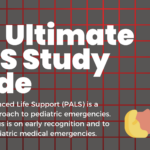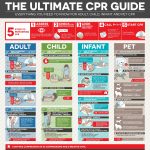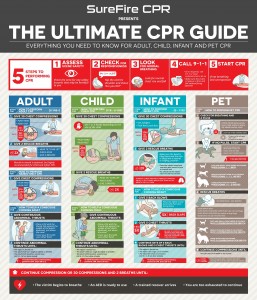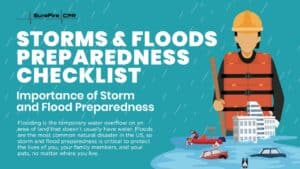Cardiac emergencies are an unfortunate reality: each year in the United States, over 356,000 individuals experience an out-of-hospital cardiac arrest. Chances are, you know someone who has or will experience a cardiac emergency. In these situations, CPR is the difference between life and death. The more people who know CPR, the more likely that victims will receive the care they need.
The best way to help spread CPR knowledge? Becoming a CPR instructor. There’s no greater feeling than knowing you’re helping others gain skills that could save a life. In this blog post, we’ll explain how to become a CPR instructor.
Why Become a CPR Instructor?
There are countless benefits to becoming a CPR instructor. As an instructor, you can make a direct impact on your community and empower others to save lives. Your students will leave your classroom feeling more confident in themselves and their skills.
CPR teaching certification is also a fantastic addition to your resume. If you’re looking to begin a career in the medical field, it can help you stand out among your peers. Plus, who couldn’t benefit from a little extra money?
If your goal is to help others, make a difference in your community, and expand your skillset, CPR instructor certification could be the right step for you. Our CPR Instructor quiz is a great starting place.
Steps to Become a CPR Instructor
Becoming a CPR instructor is no small commitment. From developing classroom management skills to becoming an expert in a variety of CPR topics, it takes a lot of focus and hard work. However, if you’re passionate about helping others, you’ll find the experience rewarding and exciting.
The following steps outline how you can get certified as a CPR instructor.
Step 1: Obtain CPR Certification
If you aren’t already, the first step is to get CPR certified. Taking a CPR training class will provide the foundation you’ll need to teach CPR. Plus, it’s a great opportunity to see firsthand what a day in the life of an instructor includes. To get certified, take a training class at SureFire CPR. If it’s been more than 2 years since you’ve taken a CPR training class, you’ll need to renew your certification.
Step 2: Gain Experience and Expertise
As a future CPR instructor, you’ll need to be extremely knowledgeable on all things CPR and first aid. In addition to certification courses, it’s a good idea to study on your own. There are lots of free resources online, including our blog. If you know someone who is a CPR instructor, you might want to reach out and see if you can talk to them about their experiences. The more insight you can gain, the better.
Step 3: Complete an Instructor Training Program
Next, you’ll take an instructor training program. This will help you develop your teaching skills and learn more about teaching styles, classroom management, and other CPR instruction best practices. You don’t even have to spend long in a training center: look into hybrid courses, with virtual lessons and a brief hands-on session in person, or find a company that walks you through the process every step of the way.
Step 4: Pass the Instructor Certification Exam and Get Monitored
After the training program, you’ll be ready to take the instructor certification exam. The AHA exam requires a score of 84% or higher to pass. Once you pass the exam, you’ll be required to be monitored teaching a class by a certified instructor trainer. They’ll make sure you’ve got everything down before issuing you your instructor card.
Step 5: Maintain Certification and Continuing Education
In order to stay accredited as a CPR instructor, you’ll need to maintain your CPR certification and your teaching certification. However, being a good instructor goes beyond meeting certification requirements. Continuing education is also extremely important. As technology develops and our understanding of cardiac emergencies changes, CPR recommendations will change. As a CPR instructor, it’s your job to stay informed on the latest AHA guidelines.
Conclusion
Everyone wants a career where they can make an impact and help others. Be someone who does: become a CPR instructor. Fill out our instructor application form today.
Ready to take the first step? Sign up for a CPR certification course with SureFire CPR today. If you have any questions on how to get certified to teach CPR, contact us. Our team of CPR instructors is here to answer any questions you may have.
FAQ’s
How long does it take to become a CPR instructor?
The exact length of time it takes can vary, but you’ll need at least enough time to take a CPR certification course and an instructor certification program, plus time to study and train.
What qualifications do I need to become a CPR instructor?
To become a CPR instructor, you need to pass a CPR certification course and a CPR instructor course.
Can I become a CPR instructor without a medical background?
Yes! You don’t need any medical background to become a CPR instructor. Future instructors will learn everything they need to know in CPR instructor classes.
How much does instructor training cost?
The cost of CPR instructor training varies by provider. It’s important to train with a reputable company like SureFire CPR. If you’re interested in training, fill out our online application for more information.
What are the career opportunities for CPR instructors?
Once you’re certified, you’ll be set for a fulfilling career as a CPR instructor. Being a CPR instructor is also a great starting place for a career in the medical field. If you’re planning to go to medical school or become an EMT, CPR instruction looks great on your resume.











